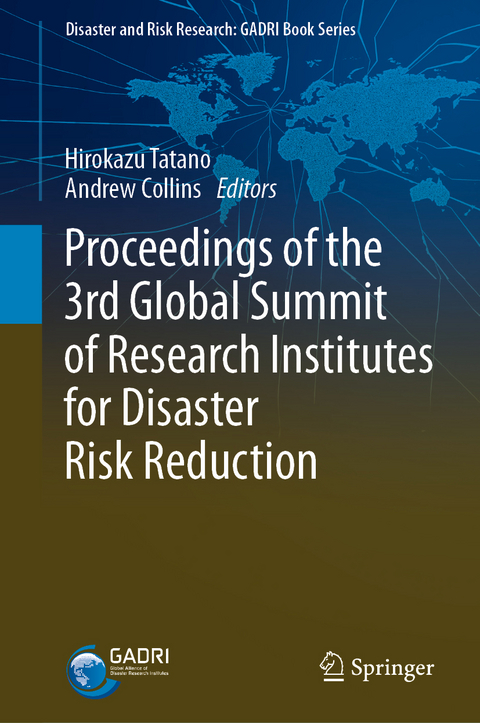
Proceedings of the 3rd Global Summit of Research Institutes for Disaster Risk Reduction
Springer Verlag, Singapore
978-981-15-8661-3 (ISBN)
The conference not only provided a platform for discussion and exchange of information on key current and future research projects on disaster risk reduction and management, but also promoted active dialogues through group discussion sessions that addressed various disaster research disciplines.
In this book, authors from various disciplines working at governmental and international organisations provide guidance to the science and technical community, discuss the current challenges, and evaluate the research needs and gaps in the context of climate change, sustainable development goals and other interlinked global disaster situations. Expert opinions from practitioners and researchers provide valuable insights into how to connect and engage in collaborative research with the international science and technical communities and other stakeholders to achieve the goals set out in the agenda of the Sendai Framework for Disaster Risk Reduction 2015–2030. In addition, case studies and other evidence-based research papers highlight ongoing research projects and reflect the challenges encountered in information sharing by various stakeholders in the context of disaster risk reduction and management.
Chapter “Science and technology commitment to the implementation of the SendaiFramework for Disaster Risk Reduction 2015-2030” is available open access under a Creative Commons Attribution 4.0 International License via link.springer.com.
Prof. Hirokazu Tatano is the Research Division Head of Disaster Management for Safe and Secure Society, the Disaster Prevention Research Institute (DPRI), Kyoto University. In addition to his responsibilities as a Professor at the DPRI, he has served as Vice President of the International Society of Integrated Disaster Risk Management (IDRiM Society) since 2010, and as Secretary General of the Global Alliance of Disaster Research Institutes (GADRI) since 2015. He has pursued pioneering research on economic consequence analysis with a major focus on economic resilience to natural disasters at the levels of individual businesses, markets, and regional economies. Another research focus is on methodologies for integrated disaster risk management and governance. Through these academic activities, he hopes to help establish “implementation science” as a key area of science for disaster risk reduction. Prof. Andrew Collins is a leader of the Disaster and Development Network and a Professor of Disaster and Development, Department of Geography, Northumbria University, UK. Beyond his research, local teaching and management responsibilities, he represents disaster, development and health-related initiatives internationally. He led the establishment of the world’s first disaster management and sustainable development postgraduate programme, launched in 2000, and the Disaster and Development Network (DDN), launched in 2004. Prior to his academic appointments, Andrew also worked internationally, including three years of voluntary support to communities in wartime Mozambique. He is currently engaged in high-level policy and advisory work, serves on the reviewing and commissioning boards for national and international organisations and multiple journals, and is involved with 13 research funding bodies.
Part 1: Overiview of the 3rd Global Summit of Research Institutes for Disaster Risk Reduction.- Chapter 1. Summary report of the 3rd Global Summit of Research Institutes for Disaster Risk Reduction: Expanding the Platform for Bridging Science and Policy Making (GSRIDRR 2017) held at the Disaster Prevention Research Institute (DPRI), Kyoto University, Kyoto, Japan from 19th to 21st of March 2017.- Chapter 2. Evaluating Current Research Status and Identifying Most Important Future Research Themes.- Part 2: Selected Papers from Keynote Speeches.- Chapter 3. Regional Science Engineering Technology and Innovation (SETI) Support for Disaster Risk Reduction.- Chapter 4. Science and technology commitment to the implementation of the Sendai Framework for Disaster Risk Reduction 2015-2030.- Chapter 5. Practical Point of View from Donors: “What we expect from science and technology group” – Application to Developing Countries.- Chapter 6. Knowledge to Sustainable Practices: International Network for Transdisciplinary Education (INATE) Approach.- Chapter 7. Disaster Risk Management Knowledge Centre: a new European Initiative to Bridge Science and Policy.- Part 3: Selected Papers from Presentations (arranged in country alphabetical order).- Chapter 8. International Federation for Information Processing and its Domain Committee on Information Technology in Disaster Risk Reduction.- Chapter 9. Research Capacity in Disaster Risk Reduction – an Indian Perspective.- Chapter 10. Participatory Flood Risk Mapping - How Participatory is It?.- Chapter 11. Grant for Global Sustainability Project: Enhancing the Urban Disaster Resilience of Kathmandu and Yangon through Local Participatory Platform Activities.- Chapter 12. Seismic Vulnerability Assessment of Existing RC Buildings in Ranau, Sabah Malaysia.- Chapter 13. Large Landslides in México in the Past 10 Years.- Chapter 14. Disaster Risk Reduction (DRR) and Management under a Changing Climate: Bridging the Divide through IntegratedCoastal Management (ICM) towards Sustainable Development.- Chapter 15. Landslide Disaster Management in Sri Lanka.- Chapter 16. Framework to Promote Multi-disciplinary Culture of Landslide Studies and Management.- Chapter 17. Disaster Resilient Infrastructure.- Chapter 18. Drought Disaster in the Central Highlands of Vietnam: Relationship Between Land-use Change and Drought’s Impact.
| Erscheinungsdatum | 15.01.2021 |
|---|---|
| Reihe/Serie | Disaster and Risk Research: GADRI Book Series |
| Zusatzinfo | 104 Illustrations, color; 3 Illustrations, black and white; XI, 250 p. 107 illus., 104 illus. in color. |
| Verlagsort | Singapore |
| Sprache | englisch |
| Maße | 155 x 235 mm |
| Themenwelt | Naturwissenschaften ► Biologie ► Ökologie / Naturschutz |
| Naturwissenschaften ► Geowissenschaften ► Geologie | |
| Technik ► Bauwesen | |
| Technik ► Maschinenbau | |
| ISBN-10 | 981-15-8661-6 / 9811586616 |
| ISBN-13 | 978-981-15-8661-3 / 9789811586613 |
| Zustand | Neuware |
| Informationen gemäß Produktsicherheitsverordnung (GPSR) | |
| Haben Sie eine Frage zum Produkt? |
aus dem Bereich


